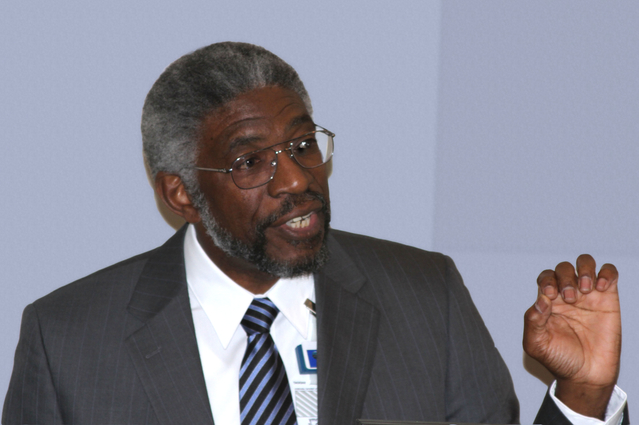Remembering Dr. King: What keeps us from realizing his dream?
But, this week, the Lab hosted a special speaker who is well known across the site -- Tommy Smith, former Strategic Diversity program director, who recently retired after 35 years of service. In his introduction of Smith, Bill Goldstein, acting deputy director for Science and Technology, noted that Smith has "embodied the teachings of Martin Luther King Jr. in his own life and his work, and has made an impact on the direction of this Lab."
Smith commented on the celebration of Martin Luther King Jr. Day as it was juxtaposed with the 2nd inauguration of Barack Obama. "America's diversity was on display," he said about the inauguration ceremony and those who took part. "But, still, we have not achieved all that was mentioned in King's "I Have a Dream Speech.""
Smith's discussion centered on the lingering impediments to the fulfillment of King's dream. He drew parallels between current societal beliefs and actions on equality and those that resonate in our country's history.
Society has not yet gotten past the difficulty of speaking about equality and race, Smith believes. Even America's founding fathers in 1787, during the Constitutional Convention, tabled the conversation on slavery.
King's dream was not just his dream -- it belonged to the founding fathers, Smith added.
"He articulated an idea that was embraced by every immigrant who came here; he encapsulated it in a way that everyone could see."
But, that dream has always been denied to certain individuals, certain groups. Some groups, he said, such as Asians and Eastern Europeans, arrived here because of economic opportunity. However, the Africans, came because they were the source of economic opportunity.
"All men are created equal," became a struggle that culminated in the Civil War.
"During the Civil Rights movement, it was clear that almost 100 years since slavery ended, our country had turned its back on the goal of equality," he said.
What Martin Luther King did, Smith contends, is bring America back to its roots, urging America not to settle for hypocrisy but to become the light for the planet. But, we are not yet there. "That same struggle is still going on," he said.
In understanding statistics that show many African American men are incarcerated, versus those who are like King or Barack Obama, Smith said that although individual choice plays a role, it's "how people are socialized that shapes how human beings behave."
"So many young people have stopped dreaming," he said. "It is a failure of our society, but this is not an indictment."
Smith then called upon the Lab to be a place where diversity can flouish and serve as a model. "When America is challenged, it calls on LLNL, because there are innovative and creative people who can get things done. The Livermore Lab can make it real."
As a final tribute and to close the observance, Smith recited with fervor a part of King's "I Have a Dream" speech.
"And when this happens, when we allow freedom ring, when we let it ring from every village and every hamlet, from every state and every city, we will be able to speed up that day when all of God's children, black men and white men, Jews and Gentiles, Protestants and Catholics, will be able to join hands and sing in the words of the old Negro spiritual:
Thank God Almighty, we are free at last."





